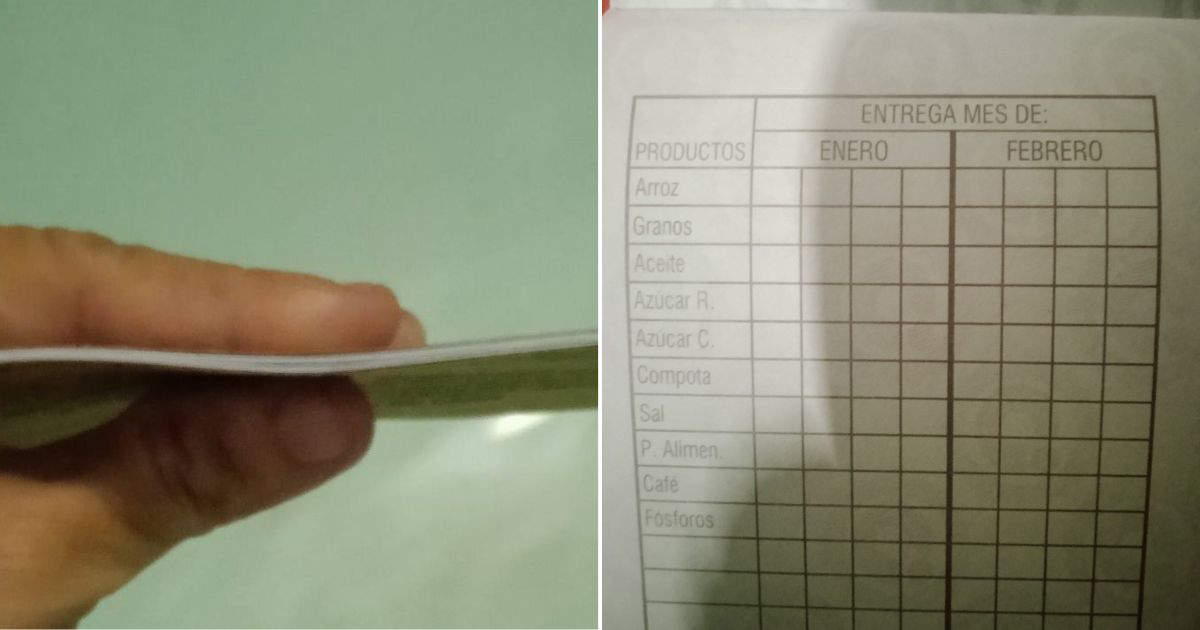
Related videos:
A Cuban criticized the current state of the ration book on social media this Monday, describing it as a reflection of the country's food situation.
A Facebook user named Asere Backagain posted several images of the notebook, noticeably thin, pointing out that it no longer even has clasps and is held together with sewing thread.
The author, with a tone heavy with humor and irony, described the situation like this: "Food sovereignty is thinning out, they don't even have clips anymore. Just sewing thread and keep pedaling," referring to the supply card, which he dubbed the "35th year of the Special Period in Cuba."
The publication also included an indirect criticism of political models that some foreign countries consider viable: "This is what Spain and other leftists are seeking for their people. Enjoy while you can."
This criticism of the Cuban regime and the supply booklet arises in the context of the recent government announcement regarding the intention to eliminate the subsidies associated with the rationing booklet.
"This impacts the budget; we are looking for the mechanisms and will implement it gradually, product by product, but it is a path that cannot be reversed," said Prime Minister Manuel Marrero Cruz during his speech at the National Assembly last December.
Additionally, he updated the plenary on the status of compliance with the government plan designed to correct economic distortions and reinvigorate the economy, one year after its approval by the Council of Ministers.
This includes pricing policies and the elimination of subsidies for basic products and services, decisions that Marrero described as "complex" due to their impact on the purchasing power of Cubans and the stability of the national currency.
"One analysis we concluded is the complete elimination of the subsidy for the basic basket, but the issue is complicated because it would not only be necessary to subsidize people in vulnerable situations. Practically, most budgeted workers would not be able to cover that difference with their salaries," said Marrero.
Nevertheless, the Ministry of Internal Trade reported last December through its official profiles that the distribution of the ration book for 2025 is guaranteed for all family units in the country.
However, although the regime assures the continuity of the system, the amount of guaranteed food is progressively decreasing, reflecting the growing economic and organizational difficulties.
Frequently Asked Questions about the Supply Booklet and the Economic Crisis in Cuba
Why has the Cuban government decided to eliminate the subsidies for the ration booklet?
The Cuban government has eliminated subsidies for the ration book as part of a plan to correct economic distortions and revitalize the economy. However, this measure has been criticized by the public, as it is perceived as an attempt to shift the burden of the economic crisis onto families in a context of scarcity and rising prices.
How does the removal of the supply booklet affect Cuban families?
The elimination of the rationing book exposes Cuban families to an even greater shortage and higher prices for basic goods. This exacerbates the economic situation of the population, which is already facing soaring inflation and insufficient salaries in Cuban pesos, further complicating access to food and essential products.
What impact does the dollarization of services have in Cuba?
The dollarization of basic services, such as mobile data, negatively impacts the majority of Cubans who receive their salaries in pesos. This measure increases the economic divide between those who have access to foreign currency and those who rely on the national currency, making it more difficult to access essential services in a context of economic crisis.
Why does the Cuban government maintain the ration book in 2025?
The Cuban government has announced that the supply booklet will remain in effect in 2025, but with a reduction in the amount of food distributed. This reflects the increasing economic and organizational difficulties faced by the country, although the system continues to be the only resource with which many Cuban families confront the economic crisis.
Filed under: